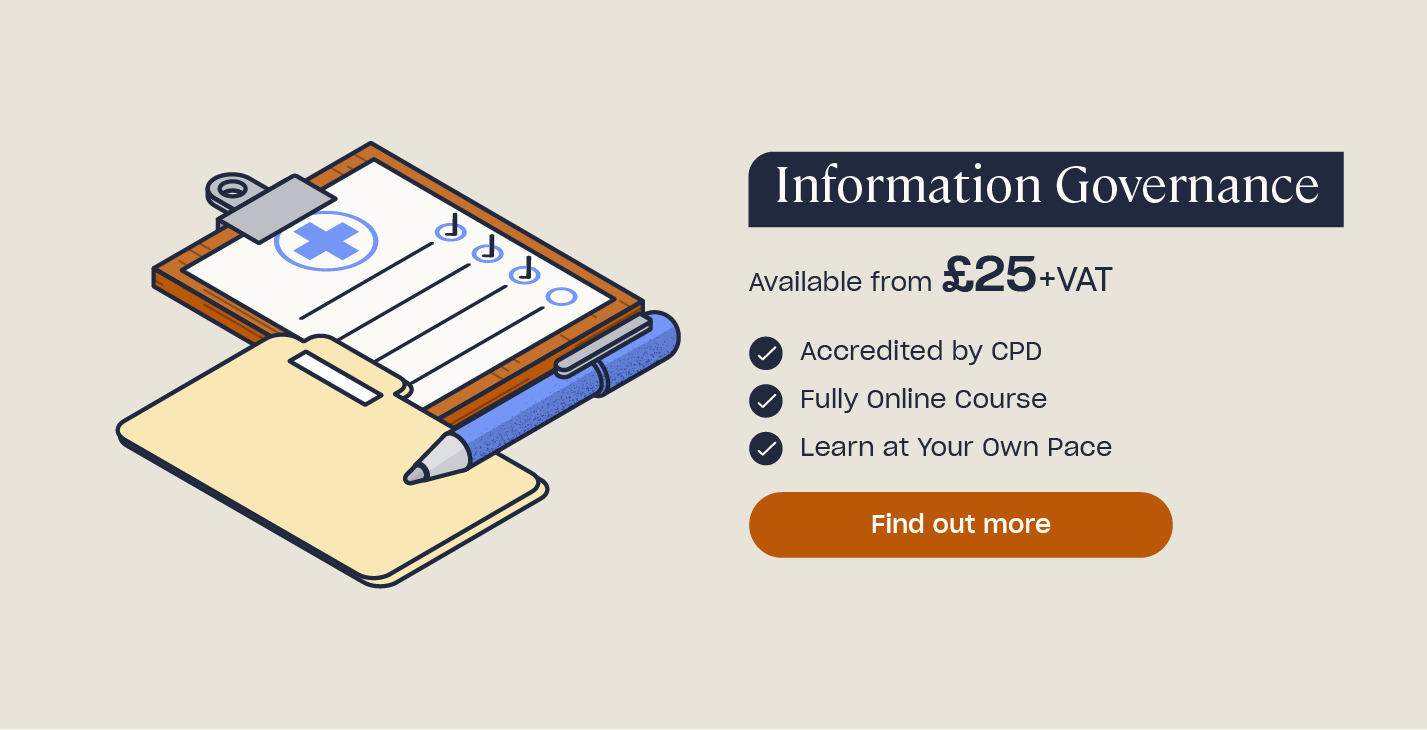Record Keeping in Health and Social Care
Record keeping is a big part of health and social care and all health and social care employees – including service managers, frontline care workers, care home workers, personal assistants and other care providers – are responsible for managing records appropriately and in accordance with the law. In this article, we’ll outline the importance of record keeping in health and social care and help you to understand how you can ensure that you maintain accurate records in your setting.
What is Record Keeping in Health and Social Care?
Record keeping is an integral part of health and social care work and an essential part of supportive, person-centred care.
Record keeping in health and social care is about writing down what you have done, what you’ve observed, any relevant decisions made and what will happen next. These records may be paper-based or digital, daily notes or formal assessments, but they all have the same aim: to communicate the right information to the right people at the right time.

These days, digital records are increasingly replacing paper records, as it’s much easier to capture and share accurate information this way. Paper records are still used in some settings, however. Examples of the types of records you might need to keep in a health and social care setting, whether digital or paper, include:
- Personal information about patients/residents.
- Care plans.
- Patient/resident legal documents.
- Accommodation information.
- Financial information.
- Referral information.
- Local authority reports.
- Written correspondence.
- Information shared by family.
- Transcripts of conversations about a patient/resident.
- Safeguarding information, concerns and records.
Why is Record Keeping Important in Health and Social Care?
Keeping good quality, accurate records is an essential part of ensuring good outcomes for the people who use your services. Record keeping is an important part of providing high-quality, safe and effective care to those who need it and ensures everyone has the right information at the right time.
Accurate record keeping benefits everyone, including the people using the service, the care providers, health and social care employees and the wider health and social care system.
Good record keeping is important in health and social care because it:
- Encourages care and support of patients/residents.
- Promotes continuity of care.
- Helps identify emerging patterns and challenges a person might be having.
- Helps to prioritise interventions.
- Improves patient/resident safety.
- Helps staff to respond more quickly to patient/resident needs.
- Promotes effective communication, both internally and externally.
- Helps to quickly and easily share important information.
- Aids others not involved with the patient/resident to quickly understand the situation.
- Reduces the chances of information duplication and errors.
- Improves accountability and transparency.
- Aids learning and helps identify mistakes, progress and achievements.
- Can be used as evidence in case of complaints, investigations or court cases.
- Ensures staff can easily comply with their legal duty to record information.
Want to Know More?
Everyone working in a health and social care setting must be fully trained in how to perform their role, care for patients and residents safely and comply with legal obligations. Our range of Health and Social Care courses covers all your training needs, from Information Governance to Advanced Safeguarding Adults and Data Protection.
Principles of Good Record Keeping in Social Care
Below are five guiding principles that will help you keep accurate, secure and person-centred records in your health and social care setting:
Principle 1: Person-Centred Records 
All records should be focussed on the person they are about. Whether a patient or resident, the record should name them directly, talk about them as an individual and address their unique care, treatment, concerns, choices and preferences. Not only does this promote the best outcome for the patient or resident, but it ensures their dignity is maintained throughout and the support they receive is tailored for them.
Making records person-centred also means involving the person in the creation of their record, in making decisions and in planning their care and support. This applies regardless of whether the person lacks capacity or has an advocate.
Principle 2: Accessibility of Records 
Records must be accessible to the right people at the right time. This means your setting should have a system that makes it easy for members of staff to create records, update records, access information when they need it and share files when required, without unnecessary barriers.
However, in the interests of data protection, records should only be accessible by those who have authorisation to view them. This includes the patient or resident themselves, the employees caring for the individual who need to fully understand the needs of the patient or resident, and anyone else who supports the person to ensure continuity of care.
Bear in mind that accessibility also refers to the language used in the records, which needs to be simple for everyone to understand. Avoid using technical jargon that can make information incomprehensible. Instead, use simple, direct words that everyone is able to follow.
Principle 3: Accurate and Realistic Records 
For health and social care records to be their most useful, the information contained within them needs to be written clearly, honestly and accurately. This means not being vague and stating the facts as they are.
Even if the information you’re recording is challenging – perhaps it’s very personal information about a patient or they’ve shown distressing or inappropriate behaviour – it’s important that you write it down explicitly so that the issue is accurately recorded. For example, avoid saying ‘resident displayed difficult behaviour’ when what you observed was inappropriate sexual contact.
Principle 4: Safe and Secure Records 
Whether your records are digital or paper-based, it’s vital that the information within them is kept secure and only seen by those who need to see it. This is a legal requirement under the Data Protection Act, as the personal information contained in health and social care records is often highly sensitive.
Keeping records safe and secure means storing it securely – such as using password protection on a computer or keeping paper files in a locked cabinet – keeping the information confidential and protecting the information from falling into the wrong hands. Consider where records are held, who can access them, how they can be accessed and, for digital records, what more you can do to keep them safe from cyber attacks.
Principle 5: Effective Information Governance 
In health and social care, information governance is an important practice that ensures personal confidential data is held, used and shared appropriately. It’s a holistic approach to data management that ensures that records are held securely, maintained accurately, protected from risks and are compliant with regulations from the moment they are created to when their retention period ends and the information is deleted or destroyed.
By having effective information governance policies and practices in health and social care, you’re able to improve the quality of care provided, act with integrity and manage risks to data safety.
How to Maintain Records in Health and Social Care
Maintaining records in health and social care is about ensuring the records you create are honest, accurate and up-to-date. It’s vital that recordkeeping is done correctly if the records are to be useful and effective.
Where possible, you should always involve the patient or resident in the creation of the record. All health and social care records should be co-produced between the member of staff writing the record and the person whom the record is about. For example, the care home assistant and the resident or the GP and their patient. This keeps your records person-centred and always in a person’s best interests.

All records should be recorded promptly and as close as possible to the event being recorded. Timely recording helps reduce the chances of inaccuracies or mis-remembered information, prevents delays in action being taken and ensures records are not forgotten about or left incomplete.
As a basic guide, the types of information you need to record includes:
- The time and date of the record.
- Your name and job role.
- The patient/resident’s name.
- The type of communication and who initiated it.
- The names and job roles of anyone else present.
- Details of any discussions had.
- Details of any decisions made or actions taken, and by whom.
- Information on what needs to happen next.
- For paper records, a signature and date.
How Long Should Social Care Records Be Kept For?
The Data Protection Act states that personal information must not be kept for any longer than necessary. By law, all types of health and social care records should only be kept for as long as you need them. They must also only be kept for the purpose for which you recorded the information in the first place and only for as long as their legal retention period allows.
Note that there is no one-size-fits-all minimum retention period for health and social care records, and some records must be kept longer than others. For example, adult social care records (including care plans) must be kept for a minimum of 8 years, children’s records are held until their 25th or 26th birthday and clinical dental records should be retained for 11 years.
When records have come to the end of their minimum retention period, it is a legal requirement that they are permanently destroyed in a manner that continues to protect the personal information contained within them. For example, in confidential waste bins or via a secure electronic data deletion service. Health and social care records of any type must never be thrown away with general waste or paper recycling.
Records can only be kept longer than their retention period in specific circumstances, such as for audits, legal proceedings, inquests, public inquiries or for Subject Access Requests.
Record keeping in health and social care is an important part of the job role and shouldn’t be seen as an administrative burden. When done timely, accurately and correctly, record keeping ensures that patients and residents receive the best possible care as information about them is always correct, up-to-date and shared with the right people at the right time.
Further Resources:
- Information Governance Training
- What are the 8 Caldicott Principles in Health and Social Care?
- How to Maintain Confidentiality in Health and Social Care







